By Prof. Wanakayi K. Omoka,

Shalom Center for Conflict Resolution and Reconciliation (SCCRR) is an inter-religious peacebuilding non-governmental organisation that works in Africa. Specifically, the eastern Africa member countries of Intergovernmental Authority on Development (IGAD). Its vision is a society where peace, justice and reconciliation prevail throughout Africa. Its mission is to work for a society free of physical violence and unjust social structures in Africa. Its main objective is to attain conflict resolution for all people in Africa through empowering local communities engaged in inter-ethnic conflict, and/or wherein religious ideological extremism is espoused, to be architects of their own interdependent future reconciled co-existence.

Where Shalom-SCCRR works; Shalom-SCCRR’s team members, Mrs. Judy Akedi MA, and Ms. Esther Kibe MA, engaging women leaders from the Turkana community in Sarima, Marsabit County, Northern Kenya.
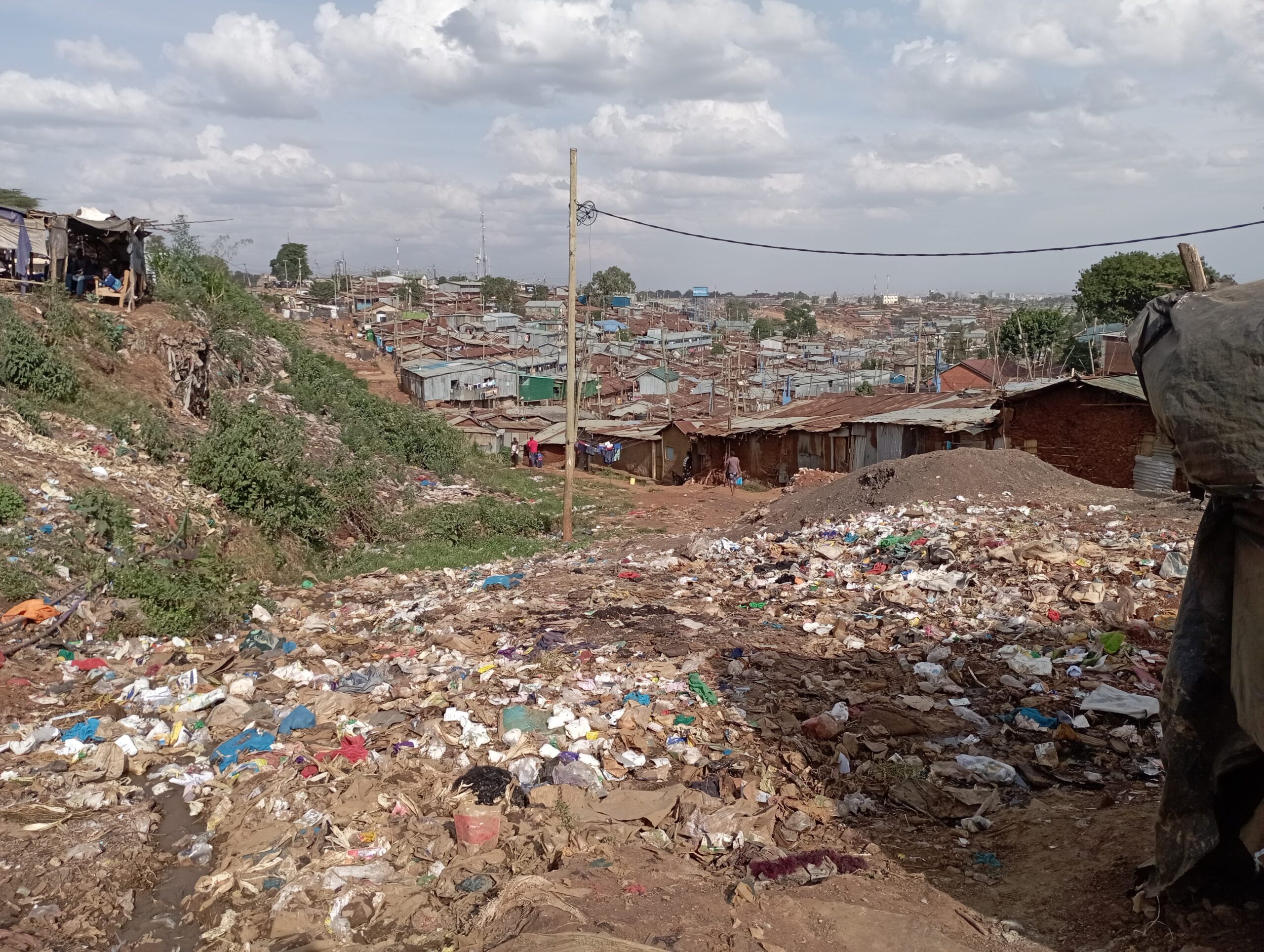
An Ariel view of Kibera slums; one of Nairobi’s informal settlements where Shalom-SCCRR works.
Shalom’s staff not only have postgraduate qualifications that befit the theoretical and practical demands of peacebuilding but also possess practiced skills in building trust between antagonistic neighboring communities and attenuating religious ideological extremism. Shalom’s vision, mission, and objectives are legitimated by the sacredness and dignity of all human life, human rights, environmental security, and an appreciation for ethnic and religious diversity. Shalom-SCCRR’s peacebuilding work comprises of structured and functionally inter-related initiatives and activities within the purview of inter-ethnic conflict along with a need to attenuate/obviate religious extremism. The initiatives/activities were as follows:
- Equipping purposively selective locals with analytical skills and peacebuilding techniques for use in conflict problem-solving and reconciliation workshops.
- Generation of sound knowledge of why/how there is inter-ethnic conflict through empirical research on which to base peacebuilding initiatives/activities, and which also lends itself to informing government/IGAD policy practices in the context of localised inter-ethnic/inter-communal conflict occurrences.
- Augmenting the conflict transformation role capacities of religious organisations, civic organisations, and non-governmental organisations.
- Training local government administration and security personnel in conflict analysis and procedural peacebuilding approaches to settle and resolve conflicts.
- Constructing and equipping inter-ethnic and inter-religious schools and institutions with requisite facilities for the purpose of countering, among other things, distrust of ethnic other as well as harboring or tending to perceive hostile intentions in the behavior of ethnic other, thereby fostering inter-ethnic/inter-communal peaceful co-existence.
Specific humanitarian-peace-development outputs – January through December 2023 – were as given below.
Conflict Transformation and Peacebuilding Achievements 2023
- 130 Conflict transformation and Peacebuilding training workshops for 36 significant Shalom-SCCRR Peace Groups of influential opinion shapers in the urban informal settlement conflict hotspots, marginalized areas of northern Kenya and at the Kenya-Ethiopia-South Sudan-Uganda interface.
- 3,753 Members of Shalom-SCCRR Peace groups empowered with conflict analytical skills for designing and implementing of locally driven and sustained conflict transformation and peacebuilding initiatives.
- 8 Training Workshops on prevention of Religious Ideological Extremism in 4 project areas located in Nairobi and Mombasa informal settlements/slums in Kenya.
- Shalom-SCCRR has a MoU with Tangaza University College in Kenya (Constituent College of The Catholic University of Eastern Africa). Rev. Dr. Patrick Devine is the current vice-chairman of the university council. The MoU addresses Research and Course Development on educational factors of Conflict Transformation Skills and Peacebuilding Techniques, countering issues of violence such as Inter-ethnic Conflict, Religious Ideological Extremism, Violence against Women and Children, Marginalization among others. Shalom provided a course there for 13 yrs and is exploring participation in a new Degree on Peace.

Mr. Godfrey Okoth MA (Ph.D. Candidate), Shalom-SCCRR Senior Project Officer, facilitating a Conflict Transformation workshop at Koru at the Kenya- Ethiopia interface in Eastern Africa – a semi-arid desert violent terrain.
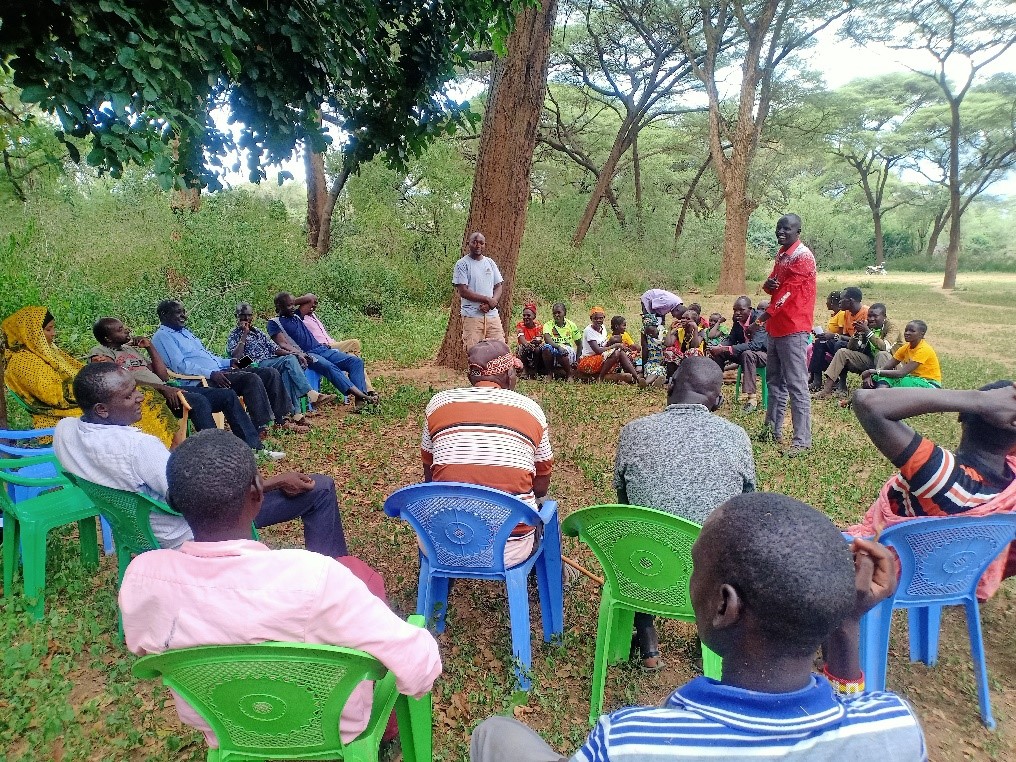

Shalom-SCCRR personnel training government officials (security agents) on methodologies and processes to bring about a society free of physical violence, structural violence, and the promotion of positive peace among communities.

Shalom-SCCRR’s Senior Project Officer, Godfrey Okoth MA (Ph.D. Candidate), engaging Samburu women in Northern Kenya on peace and development strategies for them and their families.
Shalom Empowerment Center (SEC) Addressing Violence against Women and Children in 2023
- 2,239 Women from informal urban settlements (slums) and remote and marginalized conflict environments in northern Kenya, Empowered with analytical skills and Peacebuilding techniques, for Conflict Transformation and Reconciliation.
- 1,873 Women empowered through 56 Workshops with Holistic Livelihood Resilience Capacity, Life skills, and other relevant courses and interventions, essential for resolving all forms of manifest and structural violence.
- 60% Women active involvement in Shalom-SCCRR local peacebuilding initiatives, a 17% increase compared to 2022 statistics.
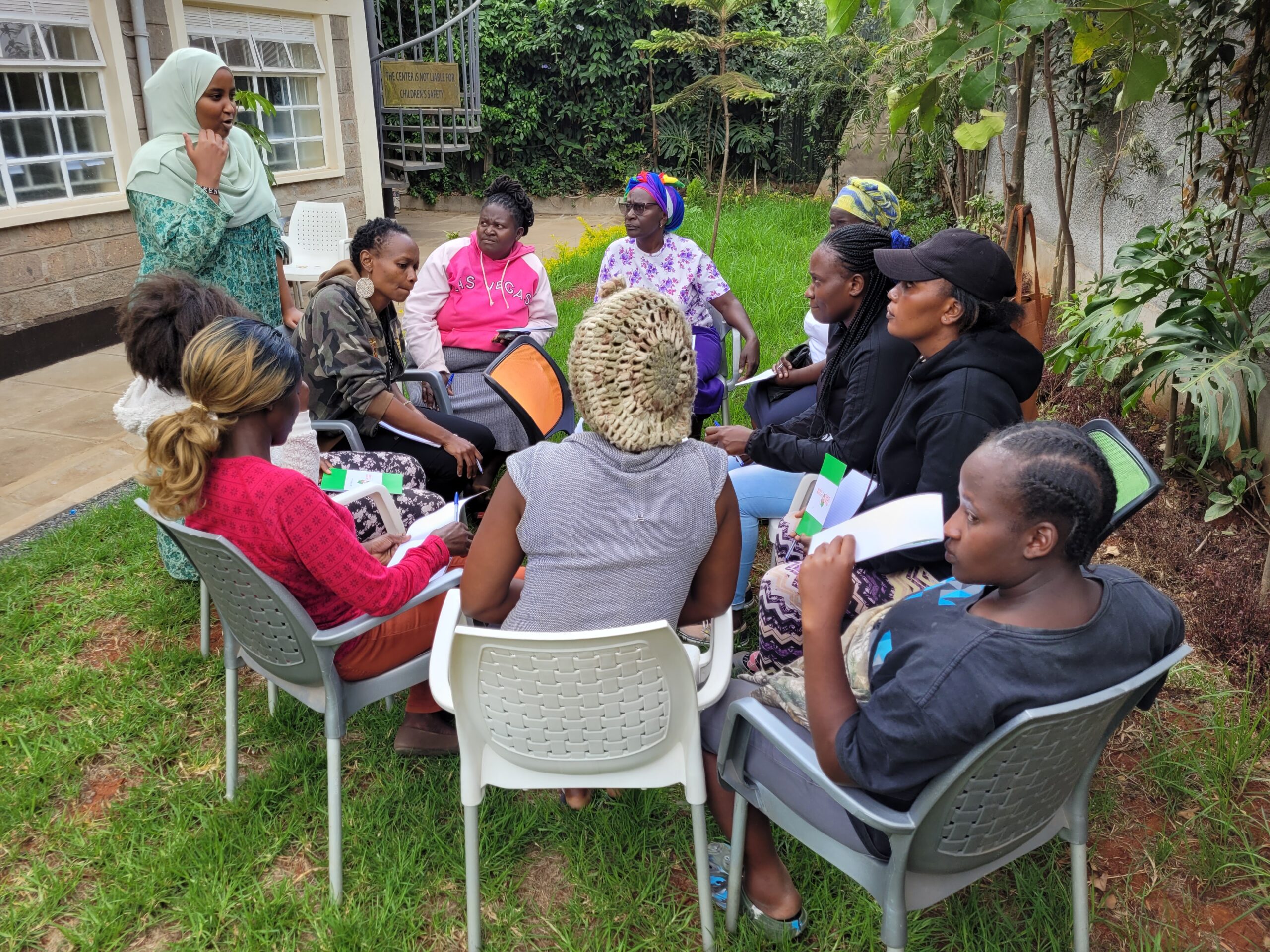
Shalom-SCCRR’s Ilhan Ali Salah BA (MA Candidate), guiding women from Ngando urban informal settlement in an interactive group discussion on the existing frameworks for conflict prevention in their areas.

Esther Kibe MA, Shalom-SCCRR Women’s Project Officer, on the ground with women from marginalized communities in Northern Kenya.
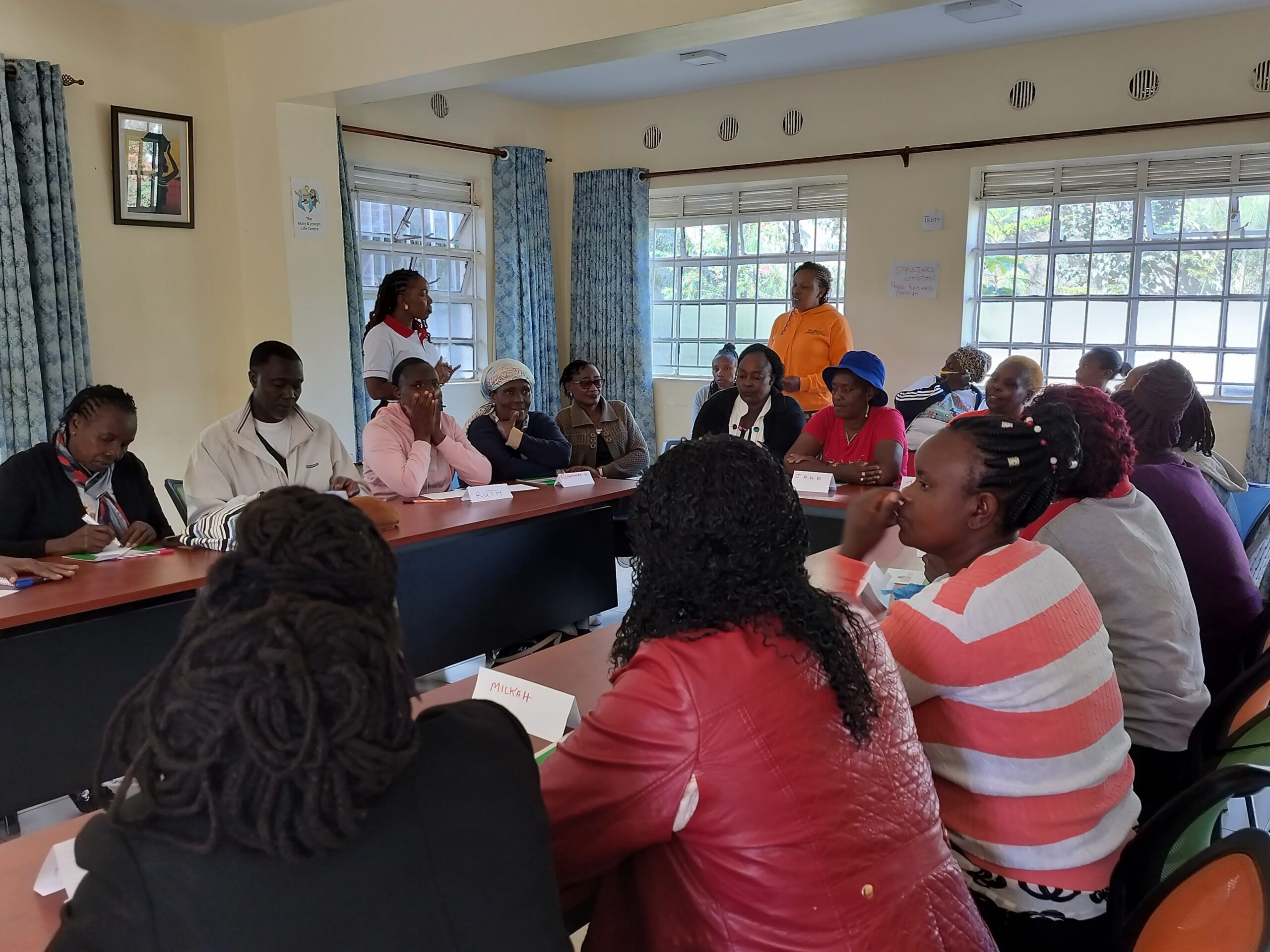
Shalom-SCCRR’s Lead Project Officer for the Women and Children Program, Judith Akedi MA, engaging Community Health Promoters (CHPs) from Kangemi Informal Settlements/slums on the dignity and rights of women and their invaluable role in resolving all forms of conflict.
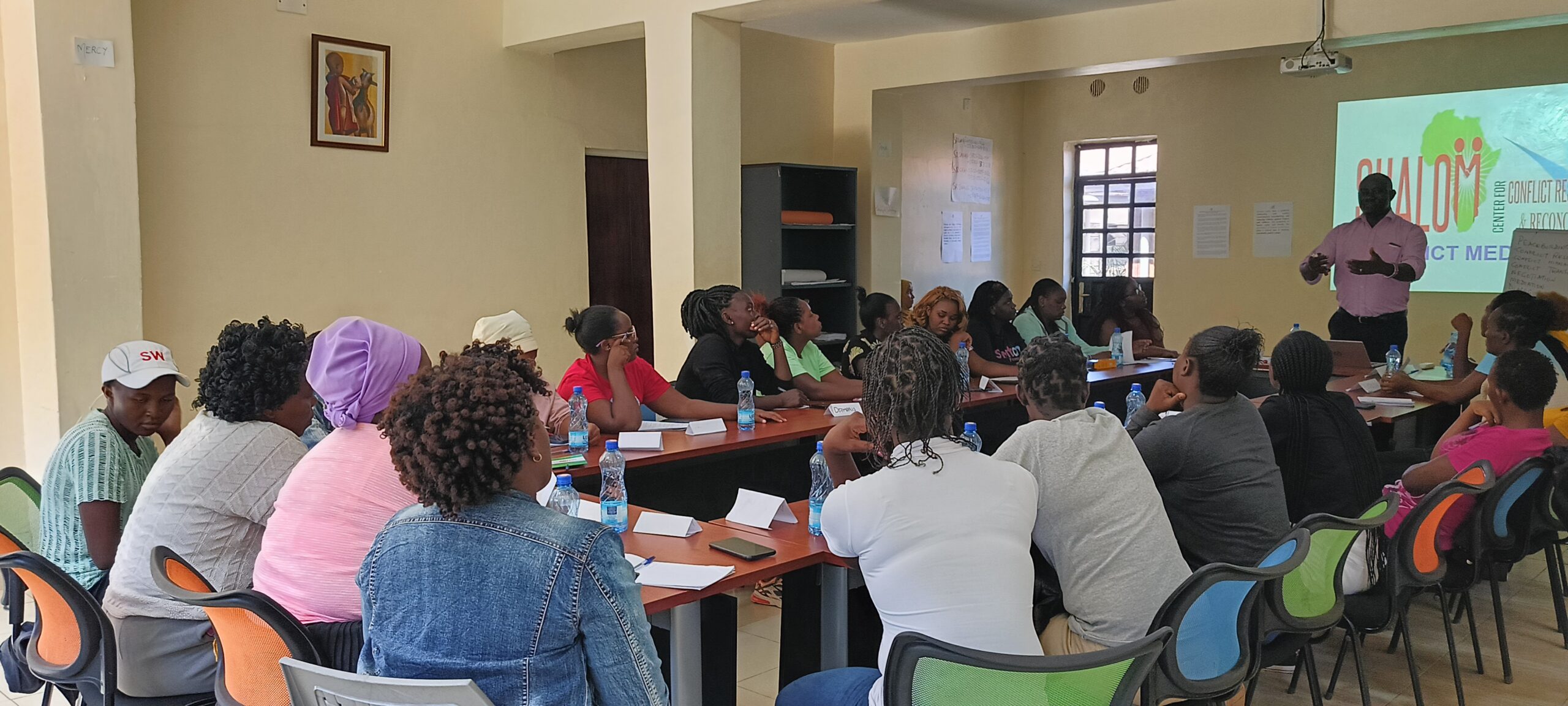
Shalom-SCCRR’s Godfrey Okoth MA (Ph.D. Candidate), facilitating a training session with women from Kangemi urban informal settlements on their role in peacebuilding.
School/Educational Development & Peace Education Achievements 2023
- 64 School/Educational Development Projects completed in 51 Institutions, emerging from Conflict Transformation interventions.
- 15,844 Pupils and Students benefiting from Shalom-SCCRR funded projects: Classrooms, Accommodation facilities, Solar lighting systems, Gender sanitary items, Books, Desks, School Water systems, Science Laboratory Equipment etc.
- 18,113 Pupils and Students benefiting from Shalom-SCCRR Peace Education Syllabus implemented in primary and secondary Schools located in violent conflict zones.
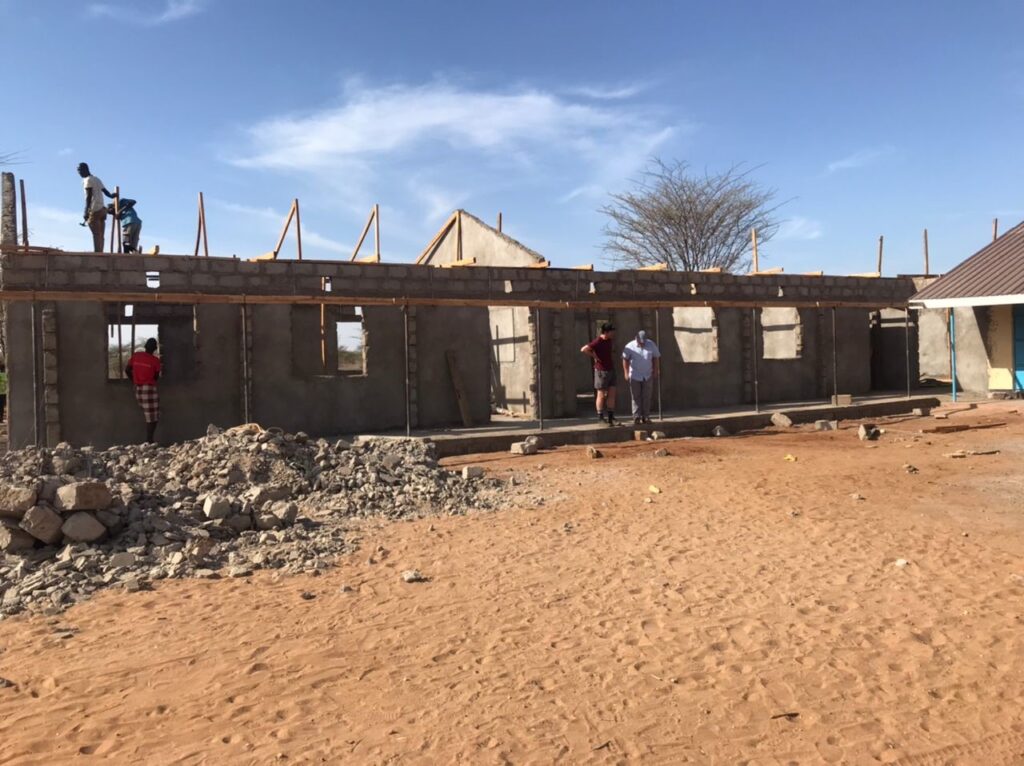
Fr. Oliver Noonan MA (Ph.D. Candidate), shalom-SCCRR Executive Director, with Mr. Ciaran King assessing the progress of Shalom-SCCRR funded classrooms construction project at St. Peter’s Nursery and Primary School, Turkana County, Northern Kenya.
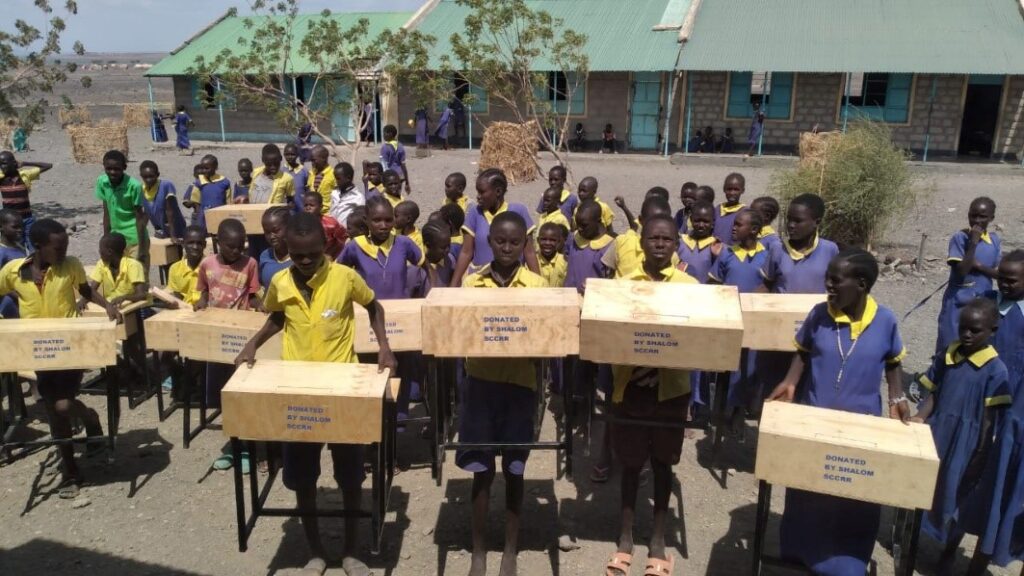
A delivery of desks and lockers by Shalom-SCCRR logistics team at Santur Primary School in Loiyangalani, Marsabit, Northern Kenya. The school was experiencing an acute shortage of sitting places for the learners.

Shalom-SCCRR’s Esther Kibe MA, having an interactive peace education session with students from Marti Secondary School. Shalom-SCCRR has also supported the school with desks, solar lighting systems, and the construction of standard classrooms and toilet facilities hence improving the teaching and learning environment in the school.
Impacts of Shalom-SCCRR, 2009 – 2023
- Communities resolving violent conflict through peaceful means in Shalom-SCCRR engaged areas.
- Operational and effective locally developed and sustained Conflict Early Warning and Response Mechanisms established in volatile areas to support conflict prevention and mitigation, thus effectively preventing deadly inter-ethnic violent incidents, with a success rate of at least 73%.
- 60% Women engaged and benefiting from Shalom-SCCRR’s Conflict Transformation, Peacebuilding and Livelihood programs (an average of 4% yearly increase over the past 14 years).
- More women participation as negotiators in peace processes among traditional ethnic communities in contexts where peace processes have been a preserve of the male folk.
- Shalom-SCCRR empowered Community/grassroots Peace Resource Persons effectively and competently handling local conflicts with a success rate of about 58%.
- Sustained peace and security in areas where Shalom-SCCRR is intervening, thus creating a supportive environment for growing of local economies, stable and safe human settlements, and development of health centers, and other social infrastructures.
- 90% success of uninterrupted learning in schools where Shalom-SCCRR is implementing conflict transformation and peacebuilding projects.
- Improved levels of trust, cooperation and collaboration between rival ethnic communities leading to joint development in areas such as: education, and livelihood activities.
- Prevented youth radicalization and religious ideological extremism in the urban slums through broad stakeholder engagement and capacity-building training to local communities’ key influential opinion shapers, religious leaders, local government administrators and civil society actors.

Prof. Wanakayi K. Omoka Director of Research and Fr. Patrick Devine PhD, working on one of Shalom-SCCRR position paper concerning Human rights.
At the heart of the Shalom-SCCRR specialized modus operandi are collaboration, empowering of local communities in conflict to be analyzers, owners and architects of their own inter-dependent future of peaceful co-existence. Shalom-SCCRR invariably uses bottom-up approach which contrasts with diagnostic solutions prescribed from top down. Shalom-SCCRR puts strong emphasis on efficiency, effectiveness, and delivery of value for money in all of its activities. Shalom-SCCRR is grateful indeed to all its donors, partners, and stakeholders who continue to support its peacebuilding effort in Africa.

Prof Omoka who was an academician, peace practitioner and devoted his career to social transformation and integral human development in Africa, observed that;
“Shalom-SCCRR is unique in its modus operandi.”
According to him, Shalom-SCCRR distinctive approach has attracted the attention of some of the highest academic institutions worldwide as well as the interest of authentic qualified social transformation practitioners working in conflict, underdeveloped and marginalised environments in Africa and beyond. Shalom-SCCRR remarkable achievements of its mission implementation according to him, are directly related to its management and international corporate stewardship. Prof. Omoka further observed that the vision, field experience, resilience and progressive leadership of Shalom-SCCRR’S international chairman, Rev. Dr Patrick Devine, are inspirational, evidenced in peace and development results, productive team work, growing international interest from scholars and policy makers, among other positive life changing dynamics.

Fergal Keane (left), the legendary BBC international affairs correspondent and Africa Editor, when internationally reporting on the conflict transformation and peacebuilding work of Shalom-SCCRR in eastern Africa, said, that
“What they do here matters to all of Africa.”
“I couldn’t agree more. It is indispensable that personnel and organizations involved in peace and development work (or planning to do so) are up to performing what the effort calls for as well as being authentic in their commitments. Their motivations and interventions should neither get short-changed by parasitic inclinations and/or abuse of the interventions to the disadvantages of African people. Shalom-SCCRR esteems itself on the pledge of its personnel to the letter of the organizational vision, mission and values. Shalom in 2020 continues to deliver while expanding its efforts to counter the spread of Covid-19, particularly in remote poverty stricken rural locations and urban slum settlements. The human and environmental security of Africa is an imperative for the peace and progress of human dignity throughout the whole world.”
Relevant Links:
- Shalom-SCCRR. (2024). 2023 Shalom-SCCRR Results and Achievements. https://shalomconflictcenter.org/wp-content/uploads/2024/01/2023-Peacebuidling-Conflict-Transformation.pdf
- Shalom-SCCRR. (2024).2009-2023 Shalom-SCCRR Results and Achievements. https://shalomconflictcenter.org/wp-content/uploads/2024/04/SV-14-Years-of-Shalom-SCCRR-2023-Report.pdf
- Shalom-SCCRR. (2024). 2023 Shalom-SCCR School/Educational Developments Results and Achievements. https://shalomconflictcenter.org/2023-shalom-sccrr-school-educational-developments-results-and-achievements/.
- Shalom-SCCRR. (2024). 2023 Shalom Empowerment Center (SEC) Addressing Violence against Women and Children Results and Achievements. https://shalomconflictcenter.org/wp-content/uploads/2024/03/2023-SEC-Report-Shalom-SCCRR.pdf
- Devine, P. R. (2022). Conflict Transformation and Peace-Building across Eastern Africa: Chairman’s Report on Progress in 2021. https://shalomconflictcenter.org/conflict-transformation-and-peace-building-across-eastern-africa-chairmans-report-on-progress-in-2021/
- Okoth, G. (2023). Shalom-SCCRR’s Data-Driven Peacebuilding Methodology: Progress in Mainstreaming Research as the basis for Communities’ Collective Action in Conflict Transformation and Peacebuilding. https://shalomconflictcenter.org/shalom-sccrrs-data-driven-peacebuilding-methodology/
- Moran, M. (2020). Eastern Africa: Shalom-SCCRR receives United Nations (UN) Accreditation. https://shalomconflictcenter.org/3901-2/
- Shalom-SCCRR. (2018). IGAD Endorses Shalom- SCCRR for United Nations Accreditation. https://shalomconflictcenter.org/igad-endorses-shalom-sccrr-for-united-nations-accreditation/
- Moran, M. (2022).Shalom Chairman delivers lecture at Harvard Kennedy School. https://shalomconflictcenter.org/shalom-chairman-delivers-lecture-at-harvard-kennedy-school/
- Kibe, E. (2022). Shalom-SCCRR’s International Chairman, Rev. Dr. Patrick Devine addresses the Harvard Kennedy School, USA. https://shalomconflictcenter.org/shalom-sccrrs-international-chairman-rev-dr-patrick-devine-addresses-the-harvard-kennedy-school-usa/
- Molumby G. (2022). Resolution of conflict requires hope and research. https://www.irishpost.com/news/resolution-of-conflict-requires-hope-and-research-238003
- Kibe, E. (2022). Fr. Patrick Devine PhD, Lecture at the National Justice & Peace Network (NJPN) Conference 2022, UK. https://shalomconflictcenter.org/fr-patrick-devine-phd-lecture-at-the-national-justice-peace-network-njpn-conference-2022-uk/
- Otsieno, J. (2023). Stellenbosch University, South Africa invited Rev. Patrick Devine PhD, from the Shalom Center for Conflict Resolution and Reconciliation (SCCRR) to present an academic module to its Masters of Divinity Students. https://shalomconflictcenter.org/stellenbosch-university-south-africa-invited-rev-patrick-devine-phd-from-the-shalom-center-for-conflict-resolution-and-reconciliation-sccrr-to-present-an-academic-module-to-its-masters-of-divinit/
- Noonan, O. (2015). Empowering the Pastoralist Communities of Eastern Africa. https://shalomconflictcenter.org/empowering-the-pastoralist-communities-of-eastern-africa/
- Devine, P. R. (2017). “Radicalization and Extremism in Eastern Africa; Dynamics and Drivers”, published in the Journal of Mediation and Applied Conflict Analysis, 4 (2): http://mural.maynoothuniversity.ie/9086/7/PD-Radicalisation-2017.pdf
- Okoth, G. & Mwangi, F. (2022). Shalom-SCCRR Facilitates at AMECEA Forum on Addressing Religious Ideological Extremism in Eastern Africa. https://shalomconflictcenter.org/shalom-sccrr-facilitates-amecea-forum-on-addressing-religious-ideological-extremism-in-eastern-africa/
- Prof. Omoka. W. K and Devine, P. R. (2020). Human Rights are a Foundation of Shalom-SCCRR’s Conflict Resolution and Reconciliation Interventions. https://shalomconflictcenter.org/human-rights-are-a-foundation-of-shalom-sccrrs-conflict-resolution-and-reconciliation-interventions-2/
- Shalom-SCCRR. (2022). Shalom Empowerment Center (SEC) Addressing Violence against Women and Children: Concept Document. https://shalomconflictcenter.org/eastern-africa-shalom-empowerment-center-sec-addressing-violence-against-women-and-children-concept-document/
- Otsieno, J. & Kibe, E. (2022). Shalom Empowerment Center (SEC) Addressing Violence against Women and Children: A Unique Shalom-SCCRR Initiative Opened. https://shalomconflictcenter.org/shalom-empowerment-center-sec-addressing-violence-against-women-and-children-a-unique-shalom-sccrr-initiative-opened/
- Erot, P. (2017). BBC and Shalom-SCCRR Confer; Engagement on the Potential Peace and Conflict Issues during and after Kenya’s October 2017 Elections. https://shalomconflictcenter.org/bbc-and-shalom-sccrr-confer/
- Shalom-SCCRR. (2019). Strong Irish Endorsement of the Work of Shalom (SCCRR); Society of African Missions (SMA), & Misean Cara (funded by Irish Aid). https://shalomconflictcenter.org/strong-irish-endorsement-of-the-work-of-shalom-sccrr/

